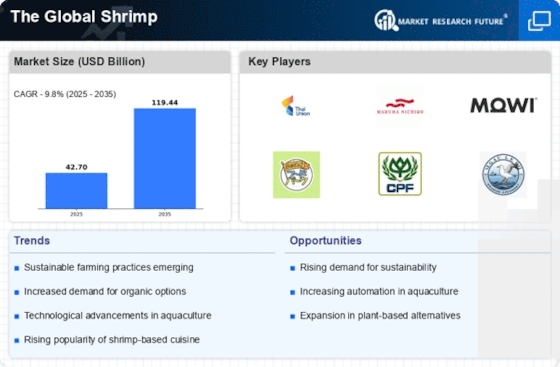Top Industry Leaders in the Shrimp Market

Strategies Adopted by Shrimp Key Players
The competitive landscape of the shrimp market is a dynamic and ever-evolving space, driven by factors such as consumer preferences, environmental concerns, and technological advancements. Key players in this market play a pivotal role in shaping its trajectory, employing various strategies to maintain and enhance their market positions.
Key Players:
- Aqua Star Corp. (Seattle, US)
- Avanti Feeds Ltd. (Hyderabad, India)
- Clearwater Seafoods Inc. (Bedford, Canada)
- High Liner Foods Inc. (Lunenburg, Canada)
- Marine Harvest (Bergen, Norway)
- Maruha Nichiro Corporation (Tokyo, Japan)
- Nippon Suisan Kaisha (Tokyo, Japan)
- Nordic Seafoods A/S (Hirtshals, Denmark)
- Surapon Foods (Muang, Thailand)
- Thai Union Group (Bangkok, Thailand)
To navigate the competitive landscape successfully, key players employ a range of strategies. Vertical integration is a prevalent approach, with companies investing in every stage of the supply chain, from shrimp farming to processing and distribution. Diversification of product offerings is another strategy, as players aim to cater to evolving consumer preferences by introducing new shrimp-based products. Additionally, partnerships and collaborations with stakeholders across the value chain contribute to market dominance.
Factors for Market Share Analysis:
Market share analysis in the shrimp industry considers several factors. Production capacity, distribution capabilities, brand strength, and product innovation are key determinants of a company's market share. The ability to adapt to changing market conditions, compliance with sustainability standards, and effective cost management also play crucial roles. Companies that can strike a balance between these factors are better positioned to capture and maintain significant market shares.
New and Emerging Companies:
In recent years, the shrimp market has witnessed the emergence of several new players seeking to disrupt the traditional dynamics. Start-ups like AquaBounty Technologies, focused on genetically engineered shrimp for sustainable aquaculture, and ShrimpBio, specializing in organic shrimp farming, are gaining attention. These newcomers aim to capitalize on niche markets and consumer trends, introducing innovative approaches to shrimp production.
Industry News and Current Companies:
Keeping a pulse on industry news is integral for understanding the competitive landscape. Recent developments include Charoen Pokphand Foods' expansion into new markets through strategic acquisitions and partnerships. Thai Union Group's commitment to sustainable practices and responsible sourcing has garnered positive attention, enhancing its reputation as an industry leader. Maruha Nichiro Corporation's focus on technological advancements in shrimp farming showcases the industry's commitment to innovation.
Investment Trends:
Investment trends in the shrimp market indicate a growing interest in sustainable and technology-driven practices. Companies are allocating significant resources to research and development, exploring ways to enhance shrimp farming efficiency and reduce environmental impact. Private equity firms and venture capitalists are increasingly investing in companies that demonstrate potential for disruptive innovations in shrimp production and processing.
Overall Competitive Scenario:
The overall competitive scenario in the shrimp market remains intense, driven by a combination of global demand, environmental considerations, and consumer preferences. Key players continue to invest in technology, sustainability, and market expansion to secure their positions. Competition extends beyond product quality and pricing to include factors such as traceability, certification, and corporate social responsibility.
Recent Developments
The shrimp market experienced noteworthy developments that shaped its landscape. Thai Union Group announced a strategic alliance with a leading technology firm to integrate blockchain solutions into its supply chain, enhancing transparency and traceability. Charoen Pokphand Foods launched a series of premium shrimp products targeting high-end markets, showcasing the company's commitment to catering to diverse consumer segments.
Maruha Nichiro Corporation introduced an AI-driven predictive analytics tool to optimize shrimp farming practices, emphasizing the industry's increasing reliance on technology for efficiency gains. AquaBounty Technologies received regulatory approval for its genetically modified shrimp, marking a milestone in the ongoing discourse around biotechnology in aquaculture.
ShrimpBio, an emerging player, secured substantial funding from investors eager to support sustainable and organic shrimp farming practices. These developments underscore the evolving nature of the competitive landscape, where technological advancements, sustainable practices, and market segmentation play pivotal roles in determining success.











